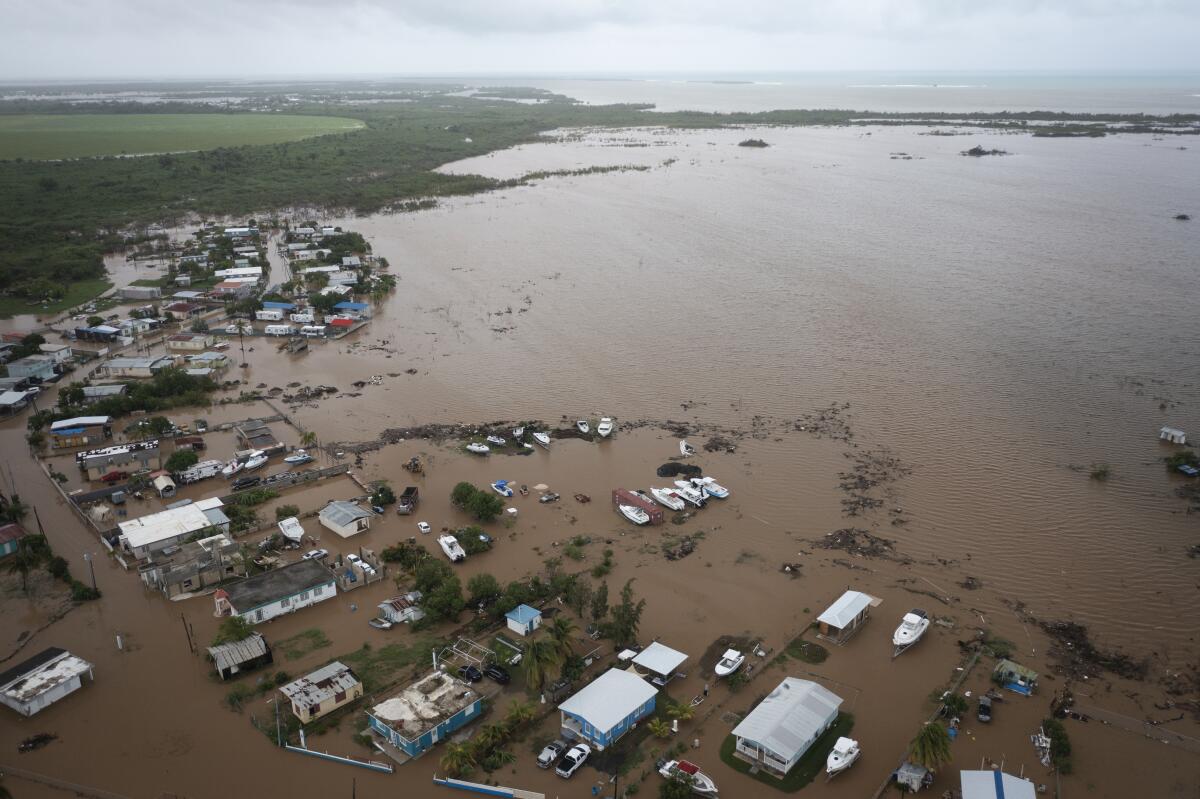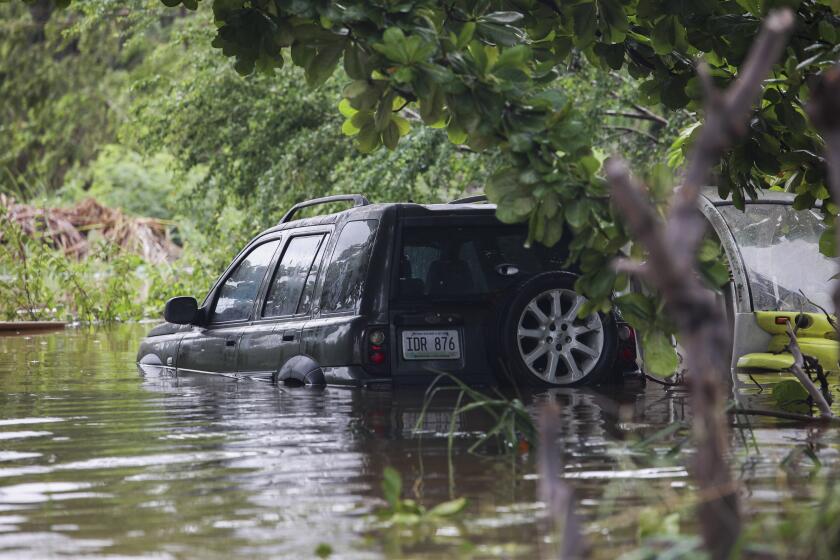How to help Puerto Rico and the Dominican Republic recover from Hurricane Fiona’s devastation

- Share via
Hundreds of people have been evacuated or rescued in Puerto Rico’s southwest coastal communities, and others on the island and in the Dominican Republic remain at risk as Hurricane Fiona continues to ravage the region.
Most of the Caribbean island has been left without power and water after the hurricane made landfall on Sunday with 85-mph winds, according to the National Hurricane Center, and a historic amount of rain.
Rain from the hurricane continued Monday, prompting the National Hurricane Center to express concern over additional effects such as life-threatening flash flood conditions, overflowing rivers and debris flow.
On Tuesday the storm dumped 30 inches of rain in the Dominican Republic, causing flooding and mudslides. The country is still dealing with the storm that’s already left 1 million people without running water.
Hurricane Fiona landed its devastating punch to Puerto Rico five years after Hurricanes Irma and Maria tore through the island only weeks apart in 2017. Those storms destroyed the power grid and killed about 3,000 people.
Hurricane Fiona blasts the Turks and Caicos Islands after devastating Puerto Rico, where most people remain without electricity or running water.
The island is still working toward recovery from the earlier storms. More than 3,000 homes to this day have only a blue tarp as a roof.
The American Red Cross, Project Hope and a number of other U.S. and international relief groups are gathering funds to help the two islands. In addition, several Puerto Rican organizations that have been helping their communities since 2017 need aid now to continue their work. Here’s how you can pitch in to those local efforts.
Taller Salud
What is does: Taller Salud is a feminist community-based nonprofit in Puerto Rico dedicated to improving women’s access to healthcare, reducing violence in community settings and fostering economic development through education and activism.
How you can help: The nonprofit is currently accepting items and money for those affected by the hurricane. Items needed include non-perishable food, toiletries, solar lanterns, water filters and water. They can be mailed to their offices:
Taller Salud
Calle 1 D40
Urb Jardines de Loíza, PR 00772
or
Taller Salud
Carr 187 km 24.4 Parcelas Vieques
#33 Mediania Alta
Loíza, PR 00772.
Cash donations are also accepted via PayPal and Network for Good.
The Happy Givers
What it does: The Happy Givers is a nonprofit that directly manages and assists a home reconstruction program in Puerto Rico and provides relief work when natural disasters occur. (It also runs a children’s home in Peru.)
How you can help: The foundation is currently accepting donations as it prepares to host and feed families on its campus. You can support The Happy Givers efforts by purchasing an item from their online store; 100% of the proceeds go toward rebuilding projects in Puerto Rico. When it’s safe, they also encourage volunteers to stay at the campus and help with light construction or cooking, for example.
Fundación Pisadas de Amor
What it does: The nonprofit serves older adults and families in Puerto Rico with food, home furnishings and mental health support, all with the goal of improving quality of life.
How you can help: Julio Enrique Soto Cuban, president and founder of the organization, took to Facebook to call on the community to check on their elders. The organization is accepting monetary donations to continue its work.
La Brigada Solidaria del Oeste
What it does: The group is a community initiative (a “mutual aid” group) in Puerto Rico that’s made up of leaders from different organizations and communities. Its goal is to promote community self-management and develop ways to solve issues without governmental help.
How you can help: La Brigada Solidaria del Oeste and allied organizations are activating their mutual support network in the wake of Hurricane Fiona. The group is accepting monetary donations to provide direct aid to affected communities.
Puerto Rico Voluntary Organizations Active in Disaster
What it does: Puerto Rico Voluntary Organizations Active in Disaster is an affiliate of the national group National VOAD. The mission of the local chapter is to strengthen the capabilities of organizations working together in the territory to respond to communities affected by disaster.
How you can help: The organization welcomes volunteers, but asks that you contact its office first by calling 787-330-0382 or emailing [email protected]. After the organization has the opportunity to assess the damage and identify unmet needs, it will match you with a trusted Puerto Rico VOAD member to work with — so be patient.
It’s also accepting monetary donations to support its members on the ground.
Hispanic Federation
What it does: The Hispanic Federation seeks to empower and support the Hispanic community and strengthen Latino institutions through disaster relief, college success programs, nonprofit advocacy, public education and national nonpartisan civic engagement. Its program UNIDOS Disaster Relief and Recovery Program serves the immediate and long-term needs of families and communities in Puerto Rico.
How you can help: The organization is currently accepting monetary donations to get emergency services and supplies directly to the people of Puerto affected by Hurricane Fiona. You can make a one-time or monthly donation.
Direct Relief
What it does: Direct Relief works in the U.S. and internationally to expand access to medicine and healthcare by equipping doctors and nurses with lifesaving medical resources. It proactively provides emergency medicine with health facilities in hurricane-prone regions of the Gulf Coast and Caribbean.
How you can help: The organization is accepting one-time or monthly monetary donations to support their efforts in Puerto Rico, the Dominican Republic and other Caribbean nations affected by Fiona.
Diaspora for Puerto Rico, Inc.
What it does: The nonprofit based in New York City was created by Puerto Ricans who relocated stateside in the last decade. It seeks to promote the wellbeing, self-sufficiency and empowerment of the Puerto Rican community through access to information about services, organizations, events and contacts in order to create a support network.
How you can help: It’s currently collecting monetary donations to support those affected by Hurricane Fiona on the island, with a fundraising goal of $50,000.
You can also purchase items from the nonprofit’s Amazon Wish List, such as portable solar generators, emergency radios, portable fans and solar chargers.
Stronger than Maria
What it does: Stronger than Maria is a nonprofit that was established to improve the standard for living for those affected by Hurricane Maria in 2017. It’s done so by rebuilding homes, distributing food and water, supplying necessary household items and providing financial assistance to families in need.
How you can help: It’s currently providing disaster relief in Puerto Rico and in need of support. The nonprofit is accepting monetary donations through PayPal.
About The Times Utility Journalism Team
This article is from The Times’ Utility Journalism Team. Our mission is to be essential to the lives of Southern Californians by publishing information that solves problems, answers questions and helps with decision making. We serve audiences in and around Los Angeles — including current Times subscribers and diverse communities that haven’t historically had their needs met by our coverage.
How can we be useful to you and your community? Email utility (at) latimes.com or one of our journalists: Jon Healey, Ada Tseng, Jessica Roy and Karen Garcia.
More to Read
Sign up for Essential California
The most important California stories and recommendations in your inbox every morning.
You may occasionally receive promotional content from the Los Angeles Times.












